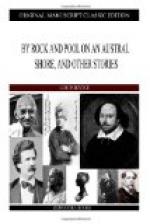Before ascending the river on a fishing trip one has to provide one’s self with a plentiful supply of cockles, or “pippies,” as they are called locally. These can only be obtained on the northern ocean beach, and not the least enjoyable part of a day’s sport consists in getting them. They are triangular in shape, with smooth shells of every imaginable colour, though a rich purple is commonest. As the back wash leaves the sands bare these bivalves may be seen in thick but irregular patches protruding from the sand. Sometimes, if the tide is not low enough, one may get rolled over by the surf if he happen to have his back turned seaward. Generally I was accompanied by two boys, known as “Condon’s Twins.” They were my landlord’s sons, and certainly two of the smartest young sportsmen—although only twelve years old—ever met with. Both were very small for their age, and I was always in doubt as to which was which. They were always delighted to come with me, and did not mind being soused by a roller now and then when filling my “pippy” bag. Pippies are the best bait one can have for whiting (except prawns) in Australia, for, unlike the English whiting, it will not touch fish bait of any sort, although, when very hungry, it will sometimes take to octopus flesh. Bream (whether black or silvery), flathead, trevally, jew-fish, and, indeed, all other fish obtained in Australia, are not so dainty, for, although they like “pippies” and prawns best, they will take raw meat, fish, or octopus bait with readiness. Certain species of sea and river mullet are like them in this respect, and good sport may be had from them with a rod in the hot months, as Dick and Fred, the twins aforesaid, well knew, for often would their irate father wrathfully ask them why they wasted their time catching “them worthless mullet.”
But let me give an idea of one of many days’ fishing on the Hastings, spent with the “Twins.” Having filled a sugar bag with “pippies” on the ocean beach, we put on our boots and make our way through the belt of scrub to where our boat is lying, tied to the protruding roots of a tree. Each of us is armed with a green stick, and we pick our way pretty carefully, for black snakes are plentiful, and to tread on one may mean death. The density of the foliage overhead is such that but little sunlight can pierce through it, and the ground is soft to our feet with the thick carpet of fallen leaves beneath. No sound but the murmuring of the sea and the hoarse notes of countless gulls breaks the silence, for this side of the river is uninhabited, and its solitude disturbed only by some settler who has ridden down the coast to look for straying cattle, or by a fishing party from the town. Our boat, which we had hauled up and then tied to the tree, is now afloat, for the tide has risen, and the long stretches of yellow sandbanks which line the channel on the farther side are covered now with a foot of water. As we drift up the river, eating our lunch, and letting the boat take care of herself, a huge, misshapen thing comes round a low point, emitting horrid groanings and wheezings. It is a steam stern-wheel punt, loaded with mighty logs of black-butt and tallow wood, from fifty feet to seventy feet in length, cut far up the Hastings and the Maria and Wilson Rivers, and destined for the sawmill at Port Macquarie.




